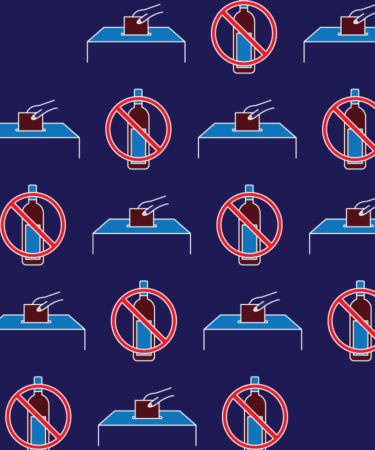On June 10, 2014, South Carolina lawmakers joined the rest of the contiguous United States in repealing Election Day prohibition. Since 1882, the state had banned restaurants, stores, and bars from selling alcohol on polling days.
“Election Day is about sorrow or joy, you should be able to buy a drink,” then-state Representative Bakari Sellers said when the state made this historic decision.
The practice of polling day prohibition has curious roots. In the era predating Prohibition, political candidates ensured liquor flowed freely on election days to help them influence undecided voters. (Even George Washington took part.) Banning alcohol, therefore, was more about policing the candidates than the citizens.
After the 21st Amendment passed in 1933, and alcohol was once again legalized, most states continued to impose some form of alcohol control on election days.
For many, the notion of Election Day prohibition might seem antiquated, or even condescending. But Puerto Rico and some Alaskan jurisdictions still ban alcohol sales on election days.
In many other countries, including almost all of Latin America, “dry laws,” or leyes secas, are still vigorously enforced.
Argentina, Brazil, Chile, Colombia, Costa Rica, Ecuador, Guatemala, the Dominican Republic, Mexico, Panama, Peru, Uruguay, and Venezuela each have their own versions of a ley seca, prohibiting the sale and public consumption of alcohol before, during, and after elections.
In Argentina, the laws come into effect at 8 p.m. the night before voters hit the polls (always a Saturday), and last until 9 p.m. on Election Sunday. In Peru, meanwhile, election weekend prohibition lasts even longer, starting at 8 a.m. on Saturday morning and continuing for a total of 48 hours. Ecuador’s 72-hour alcohol ban has historically proven to be too much for some drinkers: On Friday, Oct. 18, 2002, 857 drinkers were reportedly detained for “violating the law that bars the sale and consumption of alcohol during elections.”
In 2015, Argentina’s economy was in the midst of a crippling recession, and the presidential race between Mauricio Macri and Daniel Scioli was closely contested. At the time, I worked as the chef of a restaurant in Buenos Aires’ San Telmo neighborhood.
On Oct. 24, a Saturday night that should have been bustling with customers, the restaurant was dead — a casualty of the ley seca (also known as veda electoral in Argentina.) What our dining room lacked in customers, we made up for in nervous energy. Throughout the evening, the restaurant received hushed calls from numerous guests enquiring whether or not we were flouting the ley seca.
Ignoring the dry law is relatively common practice, but one that carries potentially harsh consequences. That night, the restaurant owner, Juan Pablo Tristan, faced a tough decision: Don’t offer alcohol, and risk a deadly slow night. And we might also be the only locale in the neighborhood not serving booze; in which case we’d almost certainly lose a large chunk of income on the week’s most profitable evening.
But breaking the law meant running the risk of surprise inspection, which had just two possible outcomes: Pay a hefty fine to the government and possibly get shut down, or pay an equally large bribe to an official. With inflation hovering around 40 percent, both scenarios had the potential to shut the business’s doors for good.
Tristan decided too much was at stake to risk selling alcohol. It was a good decision, as sometime between 9 and 10 p.m., a pair of government officials turned up at the restaurant’s doors unannounced.
A few moments later, they left the restaurant empty-handed and looking downbeat. We, on the other hand, celebrated later in the evening. During family meal, though the ley seca was technically still in effect, we opened bottles of Malbec. It was some of the finest wine I’ve ever tasted.
